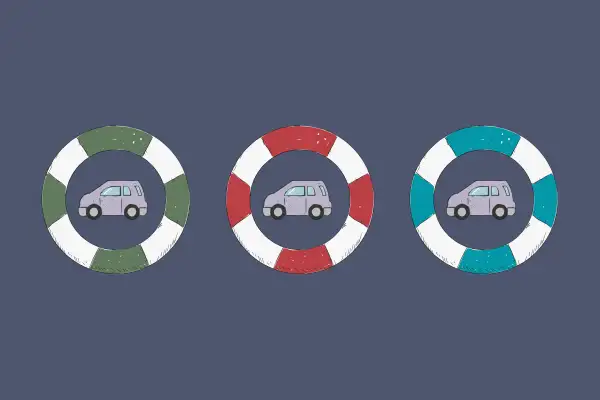How to Switch Car Insurance in 7 Easy Steps

There are many reasons to switch car insurance or at least consider shopping around for a new provider. Insurance premiums tend to increase year after year, and it's possible you could save money by switching. Significant life changes such as getting married, buying a new car or moving to a new state may also affect your car insurance premiums and give reason to browse for new policies.
If your car insurance needs have changed or you're looking to lower costs, you may want to start shopping for a new policy. In this article, we'll cover how to switch car insurance in seven easy steps and help you identify when it's the best time to make the car insurance switch.
For provider recommendations, take a look at our reviews for the best car insurance.
Table of contents
- How to switch car insurance
- Is switching car insurance worth it?
- How much does car insurance cost?
- When to switch car insurance
- When shouldn’t I switch my car insurance?
- Frequently asked questions
How to switch car insurance
Switching car insurance companies is a pretty straightforward process, but there are some things to consider before you cancel your previous policy. To find the best deal on car insurance, shop around and evaluate coverage options from different insurers. Also remember to call your current insurance company and ask an agent whether there are any cancellation fees.
There are many different types of car insurance coverage, from what's known as full coverage — a combination of liability, comprehensive and collision insurance — to medical expenses coverage and gap insurance. Understanding the differences between these policies is essential to get the right type and level of coverage.
If you need a refresher on what type of coverage to prioritize, our guide on how to buy car insurance has everything you need to know.
When you are ready to switch to a new policy, here's what to do:
1. Get quotes from multiple providers
The first step when switching car insurance companies is to shop around. Get car insurance quotes from at least three different companies, and compare coverage options, deductibles and premiums.
Drivers looking for an affordable policy may get better rates with the companies featured in Money’s best cheap car insurance article.
When seeking ways to get lower car insurance premiums, look for insurers offering discounts that apply to you and your situation. For example, some insurance providers may offer discounts for essential workers and veterans, and several companies offer discounts for cars outfitted with anti-theft devices. Many insurers offer discounts if teenage children on your policy get good grades or are away in college full-time and don't have access to the covered vehicles. Another common way to pay less is by bundling auto and home insurance coverage together with the same company.
Your credit score can affect your car insurance rate too, so if your score is low you may want to try to improve it. No matter if you have good credit or bad, you might also consider companies offering usage-based car insurance programs, which monitor driving habits and provide lower prices to drivers deemed as safe.
Depending on where you live, what's most convenient and your own comfort level, you may want to use an independent insurance agent or broker to shop around for you and find the best provider and premium. Many people find this option easier than browsing for insurance all on their own, and it generally does not cost extra to use an independent agent. Good local independent agents also often have access to smaller, more affordable insurance providers that aren't featured on national TV commercials and therefore aren't on the average person's radar. The other advantage to working with an independent agent is that you have someone specific in mind to call (or even visit in person) about questions or claims.
2. Evaluate each company's reputability and services
Next, find out more about the insurance companies you're considering. To pare down your options, read customer reviews and ask friends and family about their experience with their current car insurance provider.
Take care to check whether the company you're considering has a car insurance app and a good website from which you can easily manage your policy, file claims, track repairs and get reimbursed. Also look into whether it offers multiple payment options, around-the-clock assistance and discounts for which you may qualify.
If you want to go the extra mile, check the company's AM Best financial strength rating. This will give you a good idea of the provider’s financial stability and ability to pay for future claims.
3. Apply for a new policy
The next step in the process will be to complete the application for a new policy. To do so, you'll need the following:
- ID card and Social Security number
- Driver’s license
- Bank account information
- Vehicle information, including registration, make, model and VIN number
- Personal information and proof of residency of secondary drivers
4. Avoid a lapse in coverage
Once you've found the right company and are ready to purchase a new policy, you'll want to protect yourself against a lapse in coverage. Gaps in coverage not only leave you unprotected but may also increase your premiums later on, as some insurance companies consider you an uninsured driver (with heightened risk) for that time.
To maintain continuous coverage, make sure your new policy starts on the last day of your previous one. Alternately, you may switch companies in the middle of the policy period, but be sure to inform your old provider of when you want to cancel and ask for any refund of an overpayment.
5. Cancel your old policy
Depending on the insurer, you may be able to cancel your car insurance through the company's mobile app or website, by speaking with an agent over the phone or by submitting a written request.
If you have questions, call your current insurance company so that an agent can walk you through the cancellation process. If you’ve paid any premiums in advance, remember to ask about insurance refunds and applicable cancellation fees or penalties.
Once the cancellation is finalized, you should receive a written confirmation from the insurance provider. As a final step, check that you’ve canceled any autopay or bill pay services.
6. Let your leasing company know about your switch
Lenders and leasing companies usually require that you maintain both comprehensive insurance and collision coverage while you finance or lease your vehicle.
Once you change insurance companies, contact your lender or leasing company promptly to provide information about the new policy. If your new coverage doesn’t meet the leasing company's minimum requirements, contact your insurer as quickly as possible to adjust the policy.
7. Review for possible penalties
Your car insurer may apply a cancellation fee or penalty if you cancel your policy before the end of its term. Check your car insurance documents or contact your provider, as this fee or penalty can come in different forms.
For example, you may have to pay a flat-rate cancellation fee, after which the insurer would refund you the prorated amount of the unused premiums.
Alternatively, the insurer could apply a short-rate cancellation penalty. So, rather than including a flat-rate cancellation fee, the insurer would refund you a smaller unused premium amount than you would have received with a prorated calculation. To avoid any of these fees, you may want to arrange for your new policy to begin on the day your old policy expires.
Is switching car insurance worth it?
Researching car insurance providers, comparing prices and going through the process of switching companies can be time-consuming. You'll also have to become acquainted with the details of your new policy and your insurer's processes. With that in mind, make sure the new policy is worth the hassle.
If your main reason for switching insurance carriers is to save money on premiums, pay special attention to the types of discounts the new insurer offers and compare them to what you currently get.
A car insurance switch also makes sense if it leads to more policy options. For example, if you have concerns about premium increases due to accident claims, you could benefit from doing business with a company that offers accident forgiveness as a standard policy feature or an add-on option. Just check the terms of this perk before you change providers for it.
Now, if what you're looking for is better customer support, check your new insurer's customer reviews and industry ratings to ensure it handles claims efficiently and provides reliable service. Payment options and online account management tools may also factor into your decision to switch.
How much does car insurance cost?
How much car insurance costs can vary widely, depending on factors such as driver history, where you live, the number and type of vehicles covered, the kind of coverage and more.
The only way to get an exact figure is to reach out for personalized quotes from different insurance companies. Most major car insurers, like GEICO and Progressive, offer quotes online or have car insurance calculators on their websites that use information about you, your vehicle and driving habits to provide you a quick premium estimate. With others, you may have to get on the phone before receiving a price quote.
Some of the factors that go into determining your auto insurance premiums include:
- Your vehicle’s typical use and annual mileage
- Your accident and claims history
- The vehicle’s make, model and features
- Your age, gender and marital status
- Your location
- Any lapse in insurance coverage
- The policy’s coverage level, limits and deductibles
- Available discounts
Insurers look for risk indicators and charge higher premiums accordingly. For example, you could pay higher premiums if you are very young, have several traffic violations or accident claims, are male or unmarried, live in the city or drive an unusually high number of miles annually. Having bad credit can also hurt your rates.
Your policy’s features also heavily affect your rate. The cheapest option includes liability insurance only (with property damage and bodily injury coverage). You would pay significantly more for a full coverage option that includes liability plus collision and comprehensive coverage. In addition, opting for high coverage limits or low deductibles for these components will increase your car insurance costs.
When to switch car insurance
Consider switching car insurance if you:
Move to a new ZIP code, city or state
Car insurance is regulated differently in each state, which means you’ll have to get a new policy once you move. Keep your old policy active until you arrive at the new location, as it’s illegal to drive across state lines uninsured.
Get married
As a married couple, a new car insurance policy generally translates to lower rates. Couples can capitalize on these savings even more through loyalty discounts, multi-car discounts and bundles with renters or homeowners insurance.
Purchase a new vehicle or add an additional car to the policy
An additional car on your policy will increase your insurance rates, particularly if it's a newer model with a higher value.
See a significant boost in your credit score
Your credit score can have a direct impact on your car insurance rates. If your credit score has significantly increased since you first took out the policy, you could get a lower premium with a new insurer.
See an increase in your car insurance premium
Your current insurer won’t increase rates during the policy term, but it might do so at renewal. Although major life changes are sometimes the cause of premium increases, sometimes car insurance company raise rates due to rising costs for auto repairs or increased risk of accidents.
Add a teenage driver to your policy
Insuring teenage drivers is expensive because insurance companies consider them high-risk. Deals like “good student discounts” along with multi-vehicle, mileage and bundling discounts can help you offset the cost.
Want to increase or decrease coverage
In certain situations, your existing insurance policy may no longer align with your insurance needs. One example is a lease buyout. When leasing a car, dealerships typically demand higher coverage levels. However, the same policy may be excessive for an auto loan.
Are near policy renewal
Auto insurance policy terms expire either every six or 12 months. Before you renew, go over the policy to ensure it’s still adequate for your lifestyle and budget. You won't have to pay any penalties if you cancel near renewal, and there's no harm done by shopping around.
When not to switch car insurance
Switching car insurance companies may not be worth it if you don’t see an opportunity for significant savings. Perhaps you already have relatively affordable premiums or currently qualify for certain discounts — such as loyalty discounts — that you'd lose if you switched providers.
Another scenario in which switching carriers may not be advisable is when you’d incur a hefty fee for canceling your policy before the end of its term. You should also check state laws and contact your insurer, as you may only have the option to cancel mid-term under special circumstances.
Lastly, if you've recently filed a car insurance claim for an at-fault accident, it may be best to keep your current policy. Switching companies would mean dealing with two insurers, and you may no longer qualify for lower rates due to the recent accident on your driving record.
Switching Car Insurance FAQ
How to switch car insurance to a new car?
Insurance companies generally offer a grace period of anywhere between seven to 30 days during which they'd cover your new vehicle while you make arrangements to update the current policy or purchase a new one.
You can transfer your current coverage to the new vehicle or purchase a new policy entirely. Regardless of what you choose to do, the car dealership will let you drive the vehicle off the lot as long as you provide proof of insurance.Can I switch car insurance anytime?
You can cancel your car insurance policy near renewal without consequences. However, some insurance companies charge a cancellation fee or penalty if you cancel mid-term.
If your current provider charges cancellation fees or doesn't refund unused premiums, calculate whether what you would save on a new policy offsets the cost of canceling prematurely.How do I cancel my car insurance?
To cancel your car insurance coverage, get in touch with your insurance agent. You may be able to do it over the phone, but some providers require you to mail or fax a cancellation document with your signature.
You should receive a written confirmation of the cancellation. If you don't have an outstanding balance or pending refund, make sure to disable automatic payments.How to switch car insurance to another state?
You may want to switch to a new car insurance company once you're settled in your new state, as costs depend on your state, location and commuting distance.
If you're happy with your current provider, call your agent to learn how to transfer the policy. Remember to keep the current policy active until you reach your new home, as it's illegal to drive across state lines without insurance.More on Car Insurance
Money’s Top Picks
Car Insurance Reviews Learn More |


